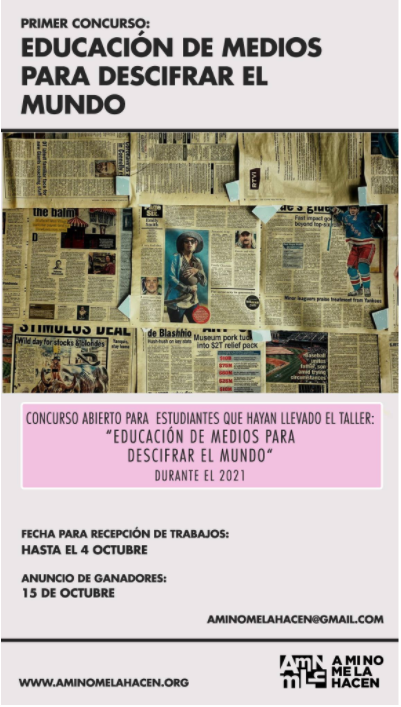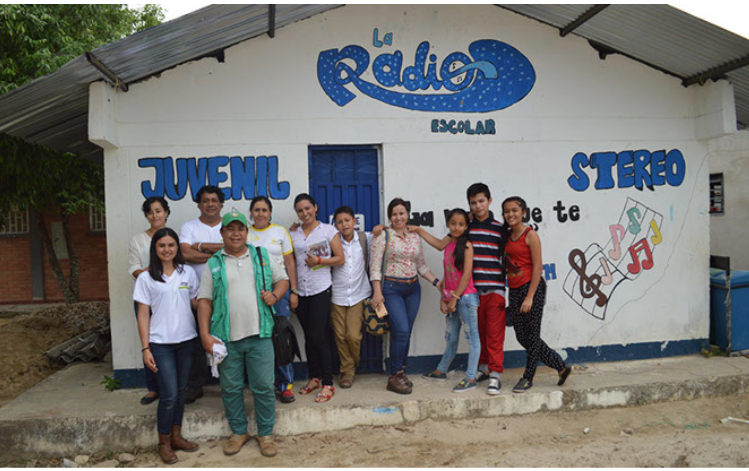Mapping Educomunicacion Projects (Part 4)
/Mapping Educomunicacion Projects (Part 4)
Edited by Julio-César Mateus, Ph.D. and Andres Lombana-Bermudez, Ph.D
Mapping the geography of educomunicación projects in Latin America is a pending task. Inspired by Martin-Barbero´s cartographic method we tracked four media education projects across the region that stand out for their contributions and diversity of approaches. These initiatives range from NGOs to community groups doing educomunicacion at schools, and through Internet and community radios. While some have been working for more than 20 years, others are just starting. Some have been born in the digital world and connected to the global media education debates, others come from local educomunicacion traditions and have recently transitioned to the digital. Such heterogeneity of projects reveals the evolution of educomunicacion in the region and the diversification and fragmentation of the field. On the 15th of june we reunited them at the second webinar “Post Pandemic Educomunicación. Learnings from Latin America 2”
“A mí no me la hacen” (AMNMLH) is a media education group born in Peru in the middle of the pandemic. Composed of an interdisciplinary team of communicators, philosophers, artists, geologists, internationalists and pedagogues, their objective is to provide a “bottom-up” response to the infodemic and public distrust in media. The group’s effort complements several Peruvian “fact-checking” initiatives which have had a limited impact fighting disinformation. Through workshops in schools, universities and institutes, as well as the creation of educational content on networks, AMNMLH seeks to “empower people so that they can judge the messages and media ecosystems where they are found”. For Manuel-Antonio Monteagudo, coordinator of the group, “many fake news thrive because one wants to question, but lacks the training to articulate their response. We want to explain to people how information creators work, how this information reaches us, how our biases process it, and how to evaluate the quality of the information we access ”. In a local context characterized by the proliferation of disinformation related to the pandemic and the 2021 Peruvian presidential elections, AMNMLH work has been on demand. Currently, AMNMLH is organizing a Peruvian media education symposium, which will take place from October 26 to 29, 2021, during UNESCO's Global Media and Information Literacy (MIL) Week.
Poster of the school contest “Media education to decipher the world” sponsored by AMNMLH
From Argentina, Ezequiel Passeron is the co-founder of an NGO called Faro Digital, whose purpose is to promote a reflective, critical and creative digital citizenship. “We consider the Internet as a public space, where it is crucial to have moments of critical thinking about our relationships with information, with others and with the world,” he says. Among other projects, the training program ‘I am digital’ (#SoyDigital) stands out, supporting creative and imaginative uses of social media among youth and adults. The program promotes strategies for dealing with issues such as grooming, gender violence, hate speech and disinformation. Another project is ‘Digital RAP, a contest promoted in conjunction with UNICEF. “RAP” is an acronym for respect, art and participation, values that the members of Faro Digital seek to promote through the voices of young people.
[Image: Workshops Faro Digital]
Free on-line workshops “How to confront hate speech” and “Children and screens” sponsored by Faro Digital in Argentina
Members of Faro Digital also participate in research projects and are aware of the need to disseminate scientific knowledge through the new formats and channels that are familiar to youth. Along these lines, together with the Esbrina Group of the University of Barcelona, they created the “Educar con sentido” (“Teach with sense”) program, a cycle of conversations and interviews with voices from the educational, communication and media ecosystem.
For its part, Comunicarte, in Colombia, is a group led by Alma Montoya that has been working for more than 25 years in educommunicacion projects, specifically with school children in conflict zones across the country. “We work on human mobility issues, whether due to migration or displacement; climate change; and human rights, such as freedom of expression”. From the production of information sheets to workshops, they found a strategic ally in community and educational radio stations. As Alma says, “it is not about becoming a teleclass, but rather generating a real and tangible learning community; remember that today there are no longer senders and receivers, but prosumers, all of us. The media are in everyone's hands, and the real question is about the content”.
[Image: Comunicarte]
School radio project in Arauquita, Colombia (Photo: Comunicarte)
Along the same line of work with vulnerable groups, the DW Akademie, the center of the German channel Deutsche Welle for the development of media and financed with public funds, promotes several initiatives of media and information literacy (AMI) in various countries, including some in Central America. For Patricia Noboa, the DW AMI project coordinator, “the idea stems from the right to access information and freedom of expression, that's why we deal with things like populism, propaganda, misinformation, etc.” They help to build networks of individuals and organizations that work on digital rights issues and participate in the public debate. At the regional level, they have developed training kits for indigenous groups, as well as an e-learning course to teach informational skills in a pandemic context. At the local level, they support initiatives conceived by local partners (mainly community radio stations and youth groups) through participatory methodologies.
Challenges and opportunities on the field
For Ezequiel Passeron, the social and digital gaps in the region are the main stumbling block, something that became even more visible with the pandemic. “Social and cultural inequalities, pre-existing and reproduced in digital spaces, should be the flags to raise from activism with a clear horizon: continue to expand the human rights of all”. Alma Montoya highlighted the challenge of access, explaining that in many of the rural areas of Colombia where she works, there are children and youth who must travel long distances to have internet access. These gaps transcend connectivity barriers and are mixed with structural socioeconomic inequalities.
The four projects aim to promote dialogue and “the encounter of the other,” the basis of educomunicacion. “The school cannot be virtualized simply by copying what was done in class. We must promote spaces where teachers and student interventions are welcomed”, says Ezequiel. Along the same lines, Patricia Noboa explained the urgency of adapting interventions to different local contexts and people's needs. That is why DW Akademy works in collaboration with local communities for their projects. For instance, “our partner in Guatemala, Comunicares, worked with members from each language community in the country and with a group of teachers to teach AMI to indigenous youth. They speak their language as well as Spanish, and that ensures that they help their communities''. Such is the importance of conceiving projects that adapt to the local context: “A game, a course, a workshop can be adjusted to the reality of another country or region”, Patricia pointed out.
Workshop on media literacy and indigenous languages in Guatemala (Photo: Comunicares)
In terms of sustainability each project is different. While some have robust public financing as in the case of DW Akademie, others have very limited funds as those provided by the Colombian Ministry of Education and local governments to Comunicarte. “Sometimes communities call us in an emergency and we have to pay the tickets, bring something to keep us warm, and find a place to sleep. We don´t say no to anything”, Alma explains. Other projects have self-financing mechanisms as in the case of AMNMLH, whose team is made up of part-time volunteers. “We do interventions in universities that allow us to have a common fund for future initiatives such as podcasts, digital materials or series on media education”, explains Manuel. In the case of Faro Digital, they fund their activities and work through multiple funders, “with international and private organizations, with the state, etc.”
Finally, the projects are very clear about the advantage of the interdisciplinary approach to create new pedagogies and imaginaries. Creating spaces for reflection and criticism goes beyond schools and educators: they can take place inside of people's homes, where media also reaches. “Digital gaps, of course, are not limited to connectivity problems: they include socioeconomic conditions, cultural capital, disposition of the homes, etc.”, affirms Ezequiel. In this sense, a major challenge is to form multidisciplinary teams that address complex issues, such as how artificial intelligence changes the production and consumption of content. “In order to be critical we must understand how digital platforms work.” It is from that critical, creative and dialogic perspective that Latin American projects meet and respond to the principles of educommunicacion.
Webinar Panelists
Manuel-Antonio Monteagudo (@ManuelMontea) is a French-Peruvian filmmaker and coordinator of “A Mi No Me La Hacen”, an association dedicated of providing Media and Information Literacy workshops and stimulating a national conversation on MIL as a way to answer to the Infodemic and reinforcing democracy. He has a Bachelor’s Degree in Political Sciences from Sciences Po Paris, and a Master’s Degree in Journalism from Sciences Po’s School of Journalism. He directs fiction and documentary projects in France and Peru.
Ezequiel Passeron, (@farodigitalok) Institutional director at Faro Digital. Ph.D candidate in “Education and Society” at the University of Barcelona. Coordinator of “Conectados al Sur” network. Associate professor at the University of Barcelona. Member of “ESBRINA — Subjetividades, visualidades y entornos educativos contemporáneos (2017SGR1248) research group. His research activity focuses on the intersections between communication, education and digital media.
Patricia Noboa Armendáriz (@PatyeNoboa), is the DW Akademie program director in Guatemala and Central America. She develops media projects for freedom of expression and access to information focused on Media and Information Literacy (MIL). She is Ecuadorian journalist with experience in radio, television and media production for youth. She has a degree in communication and journalism from the Pontificia Universidad Católica del Ecuador and a Master in “International Media Studies” from the University of Bonn and the Hochschule Bonn-Rhein-Sieg, in Germany.
Special thanks:
We want to thank Alejandro Núñez Álberca for his committed help transcribing the two educomunicacion webinars, and editing and translating this post. Alejandro is a research assistant at the Institute of Scientific Research (IDIC) at the University of Lima and a lecturer in the Peruvian Institute of Arts and Design (IPAD).






